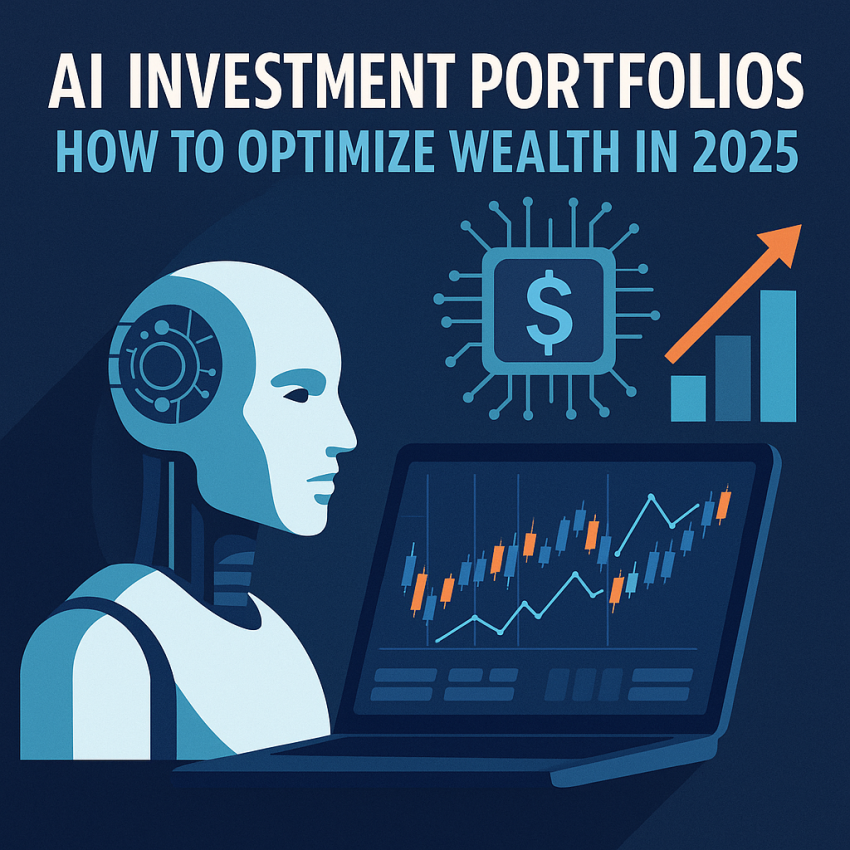AI Investment Portfolios: How to Optimize Wealth in 2025
The financial world has experienced dramatic shifts over the past few decades, with one of the most notable developments being the integration of artificial intelligence (AI) into investment strategies. AI-driven investment portfolios are becoming increasingly popular as they offer efficiency, speed, and precision in managing wealth. In 2025, AI technologies are expected to play a pivotal role in transforming how individuals and institutions approach investing, making wealth optimization more accessible than ever.
Understanding AI in Investment Management
AI, or artificial intelligence, refers to the capability of machines to perform tasks that traditionally required human intelligence. In the context of investment, AI can process vast amounts of data, analyze trends, predict market movements, and make real-time decisions faster than any human could. Unlike traditional investment methods that rely on human judgment and expertise, AI utilizes data-driven algorithms to optimize wealth.
The Role of AI in Wealth Optimization
One of the main benefits of AI in wealth management is its ability to analyze large datasets. AI algorithms can identify market trends, fluctuations, and patterns that human analysts might miss, allowing for quicker decision-making. By optimizing asset allocation, AI can help investors balance their portfolios and reduce risk, ensuring better returns over time.
How AI Investment Portfolios Work
AI investment portfolios work by leveraging machine learning models, natural language processing, and data analytics to build and manage a portfolio. These technologies enable AI systems to evaluate stocks, bonds, and other financial assets based on a set of parameters such as risk tolerance, historical performance, and market conditions.
AI Portfolio Management vs. Traditional Methods
Traditional investment management often involves human financial advisors who analyze market trends and manage portfolios based on their expertise. However, AI-driven portfolios can process data at a much faster rate, continually adjust strategies, and learn from past performance. Unlike traditional methods, AI-powered portfolios offer more personalized strategies tailored to individual financial goals and risk profiles.
Key Benefits of AI in Investment Management
AI has numerous advantages that make it an appealing choice for investors. Here are some key benefits:
-
Enhanced Efficiency
AI portfolios can process large amounts of data in seconds, which means investors can make informed decisions faster. The ability to analyze real-time market conditions and adjust strategies ensures that portfolios are always optimized for the current market environment. -
Risk Management
AI-driven portfolios use advanced algorithms to assess risk and adjust portfolios accordingly. By continuously monitoring market conditions and identifying potential risks, AI can help mitigate losses during volatile periods. -
Personalization
One of the most attractive features of AI in wealth optimization is its ability to tailor strategies to individual investors. AI can evaluate an investor’s unique financial situation and create a personalized portfolio that aligns with their goals, risk appetite, and preferences.
Challenges of AI Investment Portfolios
While AI offers many advantages, it also comes with its own set of challenges. One of the main challenges is the reliance on historical data for predictions. AI models are trained based on past performance, but market conditions are constantly changing, which means that AI systems may not always predict the future accurately.
The Need for Human Oversight
Despite its advantages, AI is not infallible. Human oversight is essential to ensure that AI portfolios are aligned with long-term investment goals. Investors should work with financial advisors who understand AI-driven investment strategies to ensure that their portfolios are being managed effectively.
The Future of AI in Wealth Optimization
In 2025 and beyond, the role of AI in wealth optimization will continue to expand. As AI technologies become more advanced, they will be able to analyze even larger datasets and provide even more accurate predictions. Additionally, AI will continue to evolve, incorporating emerging technologies such as blockchain and quantum computing to further enhance portfolio management.
The Impact of AI on Global Financial Markets
AI is already having a profound impact on global financial markets. As more investors adopt AI-driven portfolios, traditional investment management firms may need to adapt to stay competitive. Furthermore, the rise of AI in investing may lead to greater market transparency and a reduction in human error.
Investing with AI is an exciting and promising way to optimize your wealth in 2025. To get started, individuals should consider working with financial advisors who specialize in AI-driven portfolios. By understanding the benefits, risks, and potential of AI in wealth optimization, investors can make informed decisions and leverage this technology to grow their wealth effectively.
#AIInvestment #WealthOptimization #MachineLearning #FinancialAI #InvestmentStrategies








